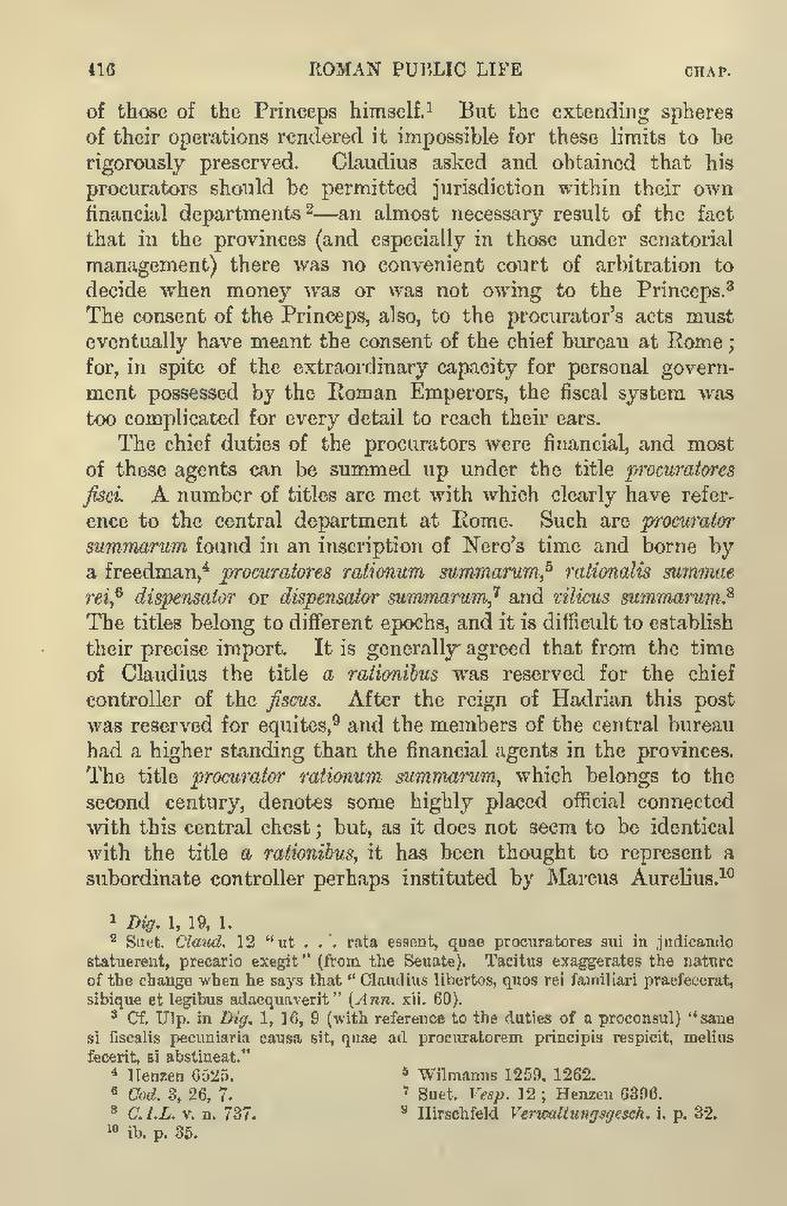of those of the Princeps himself.[1] But the extending spheres of their operations rendered it impossible for these limits to be rigorously preserved. Claudius asked and obtained that his procurators should be permitted jurisdiction within their own financial departments[2]—an almost necessary result of the fact that in the provinces (and especially in those under senatorial management) there was no convenient court of arbitration to decide when money was or was not owing to the Princeps.[3] The consent of the Princeps, also, to the procurator's acts must eventually have meant the consent of the chief bureau at Rome; for, in spite of the extraordinary capacity for personal government possessed by the Roman Emperors, the fiscal system was too complicated for every detail to reach their ears.
The chief duties of the procurators were financial, and most of these agents can be summed up under the title procuratores fisci. A number of titles are met with which clearly have reference to the central department at Rome. Such are procurator summarum found in an inscription of Nero's time and borne by a freedman,[4] procuratores rationum summarum,[5] rationalis summae rei,[6] dispensator or dispensator summarum,[7] and vilicus summarum.[8] The titles belong to different epochs, and it is difficult to establish their precise import. It is generally agreed that from the time of Claudius the title a rationibus was reserved for the chief controller of the fiscus. After the reign of Hadrian this post was reserved for equites,[9] and the members of the central bureau had a higher standing than the financial agents in the provinces. The title procurator rationum summarum, which belongs to the second century, denotes some highly placed official connected with this central chest; but, as it does not seem to be identical with the title a rationibus, it has been thought to represent a subordinate controller perhaps instituted by Marcus Aurelius.[10]
- ↑ Dig. 1, 19, 1.
- ↑ Suet. Claud. 12 "ut . . . rata essent, quae procuratores sui in judicando statuerent, precario exegit" (from the Senate). Tacitus exaggerates the nature of the change when he says that "Claudius libertos, quos rei familiari praefecerat, sibique et legibus adaequaverit" (Ann. xii. 60).
- ↑ Cf. Ulp. in Dig. 1, 16, 9 (with reference to the duties of a proconsul) "sane si fiscalis pecuniaria causa sit, quae ad procuratorem principis respicit, melius fecerit, si abstineat."
- ↑ Henzen 6525.
- ↑ Wilmanns 1259, 1262.
- ↑ Cod. 3, 26, 7.
- ↑ Suet. Vesp. 12; Henzen 6396.
- ↑ C.I.L. v. n. 737.
- ↑ Hirschfeld Verwaltungsgesch. i. p. 32.
